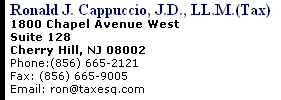Put Away
Cash
for "Reasonable"
Needs |
A corporation that accumulates more
than $250,000 in retained earnings could be slapped with an
expensive penalty tax by the IRS. Fortunately, you can escape
the "accumulated earnings tax" with some shrewd moves.
You're allowed to retain cash for legitimate,
reasonable future business needs. How does the tax law define
reasonable? Thereís no exact definition but the IRS says that
any plans for excess cash must be "specific, definite and
feasible." Otherwise, your firm
|
 In general, C corporations canít
stockpile more than $250,000 ($150,000 for personal
service corporations) unless the money is being retained
for the "reasonable needs of the
business." In general, C corporations canít
stockpile more than $250,000 ($150,000 for personal
service corporations) unless the money is being retained
for the "reasonable needs of the
business."
| could face
the accumulated earnings tax in addition to its regular
corporate tax. The penalty is 15 percent for 2005.
The reason for the penalty tax is to keep
business owners from keeping earnings in their corporations so
they don't have to pay taxes on the dividend
distributions.
The good news
Corporations frequently fight the IRS on this issue ó
and win. For example, some businesses successfully put money
aside to modernize their facilities or build new offices.
In one case, a Texas corporation convinced the Tax
Court that it needed excess earnings for several reasons,
including renovation, expansion, and the possible redemption
of shareholder stock.
The firm wisely documented discussions of its plans and the
court noted that officers exercised "prudent business
judgment." (Knight Furniture Co., Inc. TC Memo
2001-19)
The key to beating the IRS is to establish a plan based on
the reasonable, legitimate future needs of your business. Make
sure to discuss the issue with your tax adviser and document
the plans in your corporate minutes.

| 































